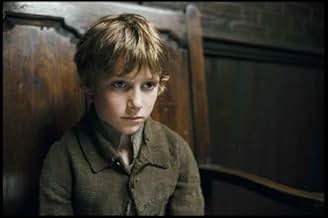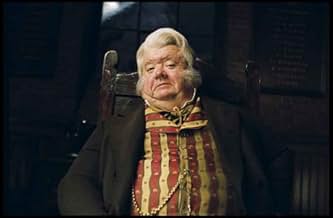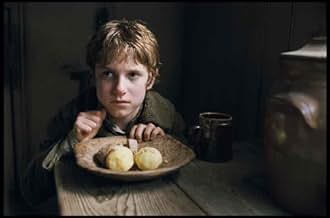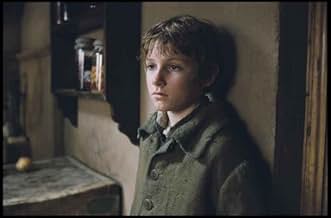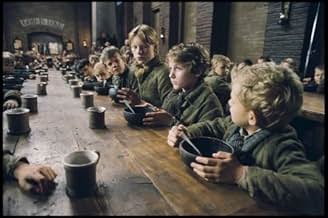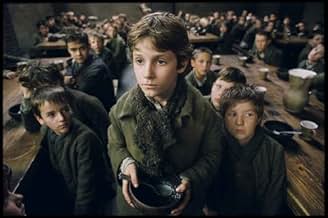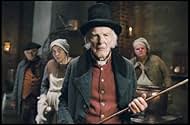CALIFICACIÓN DE IMDb
6.8/10
35 k
TU CALIFICACIÓN
Una adaptación de la historia clásica de Dickens en que un huérfano conoce a un ladrón en las calles de Londres que le enseña, como a muchos otros jóvenes, la profesión.Una adaptación de la historia clásica de Dickens en que un huérfano conoce a un ladrón en las calles de Londres que le enseña, como a muchos otros jóvenes, la profesión.Una adaptación de la historia clásica de Dickens en que un huérfano conoce a un ladrón en las calles de Londres que le enseña, como a muchos otros jóvenes, la profesión.
- Dirección
- Guionistas
- Elenco
- Premios
- 2 premios ganados y 4 nominaciones en total
Joe Tremain
- Hungry Boy
- (as Joseph Tremain)
- Dirección
- Guionistas
- Todo el elenco y el equipo
- Producción, taquilla y más en IMDbPro
Opiniones destacadas
Adapted from the classic Dickens tale, Oliver Twist is the story of an idealistic orphan struggling to survive in a savage adult world. A world where hypocrisy, greed and cunning are celebrated and there are only rare glimpses of compassion.
The film focuses on the key events of the Dickens novel, excluding many of the subplots and associated characters. It opens with Oliver's (Barney Clark) arrival at the workhouse of "Please Sir, can I have some more" fame and follows his escape to London and its dingy underworld. Here he falls in with a band of pickpockets led by Fagin (Ben Kingsley) - a central character typifying hypocrisy, greed and cunning - but finds salvation in the form of Mr Brownlow (Edward Hardwicke) who recognizes the goodness in Oliver and endeavors to extract him from his, albeit unsuccessful, life of thievery.
As he did with his award-winning, "The Pianist", Polanksi drew on his own life experiences as an orphan in the ghettos in World War II to recreate certain moods. Grim, grimy and often claustrophobic, "Oliver Twist" startlingly depicts a callous world where children live at the whim of ruthless, self-serving adults. But the horror of this dark, unforgiving world is relieved by the inclusion of humour and banter throughout, making the film both captivating and entertaining.
As Oliver, Barney Clark exemplifies the helplessness of an innocent at the mercy of strangers and being manipulated for their benefit. As noted by Mr Sowerberry, the undertaker, "There's an expression of melancholy in his face, my dear, which is very interesting. He'd make a delightful mute". And mute and incapacitated - be it through hunger, illness, injury and/or fear - he is for much of the film. Other than a surprising brief show of defiance that takes him from the coal shed and sets him on the road to London, there is little evidence of any determination, strength or willfulness at all in this Oliver. But unfortunately there is little to endear him either and the film suffers for it.
Harry Eden has more depth and is much more compelling as the Artful Dodger. Plucky and likable, his struggle with the consequences of his betrayal of Nancy (Leanne Rowe) is agonising. Ben Kingsley is masterful and almost unrecognizable as Fagin. Depicted as pure evil in the novel, Polanksi strives to give this character humanity and meaning. The result is a foul, exploitative, groveling survivor a desperate and pitiful villain, but not a completely heartless one.
The elimination of many of the twists of the novel means that this film may disappoint viewers familiar with the intriguing undercurrents of Dickens' plot and richness of his characters' and their relationships. The only incredible discovery that Oliver makes in this version is that there is a better life to either the workhouse or the den of thieves.
While adaptation to film necessitates simplification of the story and as Polanksi points out "For today's taste, you need to abandon a certain amount of melodrama that was very typical for the period", it is easy to feel that in this paring down we have been left with an entertaining adventure set in 19th century Britain. When it comes to this Oliver, less is not more.
The film focuses on the key events of the Dickens novel, excluding many of the subplots and associated characters. It opens with Oliver's (Barney Clark) arrival at the workhouse of "Please Sir, can I have some more" fame and follows his escape to London and its dingy underworld. Here he falls in with a band of pickpockets led by Fagin (Ben Kingsley) - a central character typifying hypocrisy, greed and cunning - but finds salvation in the form of Mr Brownlow (Edward Hardwicke) who recognizes the goodness in Oliver and endeavors to extract him from his, albeit unsuccessful, life of thievery.
As he did with his award-winning, "The Pianist", Polanksi drew on his own life experiences as an orphan in the ghettos in World War II to recreate certain moods. Grim, grimy and often claustrophobic, "Oliver Twist" startlingly depicts a callous world where children live at the whim of ruthless, self-serving adults. But the horror of this dark, unforgiving world is relieved by the inclusion of humour and banter throughout, making the film both captivating and entertaining.
As Oliver, Barney Clark exemplifies the helplessness of an innocent at the mercy of strangers and being manipulated for their benefit. As noted by Mr Sowerberry, the undertaker, "There's an expression of melancholy in his face, my dear, which is very interesting. He'd make a delightful mute". And mute and incapacitated - be it through hunger, illness, injury and/or fear - he is for much of the film. Other than a surprising brief show of defiance that takes him from the coal shed and sets him on the road to London, there is little evidence of any determination, strength or willfulness at all in this Oliver. But unfortunately there is little to endear him either and the film suffers for it.
Harry Eden has more depth and is much more compelling as the Artful Dodger. Plucky and likable, his struggle with the consequences of his betrayal of Nancy (Leanne Rowe) is agonising. Ben Kingsley is masterful and almost unrecognizable as Fagin. Depicted as pure evil in the novel, Polanksi strives to give this character humanity and meaning. The result is a foul, exploitative, groveling survivor a desperate and pitiful villain, but not a completely heartless one.
The elimination of many of the twists of the novel means that this film may disappoint viewers familiar with the intriguing undercurrents of Dickens' plot and richness of his characters' and their relationships. The only incredible discovery that Oliver makes in this version is that there is a better life to either the workhouse or the den of thieves.
While adaptation to film necessitates simplification of the story and as Polanksi points out "For today's taste, you need to abandon a certain amount of melodrama that was very typical for the period", it is easy to feel that in this paring down we have been left with an entertaining adventure set in 19th century Britain. When it comes to this Oliver, less is not more.
Polanski is the kid of guy who likes to dance on the edge. A mixture of clown, genius and artist who has suffered personal tragedy and humiliation but one who keeps cranking amazing films. This Oliver Twist is no exception. Polanski has reworked the story and taken out the 19th century coincidences, e.g., the highly improbable fact that Oliver is Brownlow's grandson and the business with the portrait of Oliver's mother, given the old tale a fresh coat of paint with new amazing character actors such as Leanne Rowe, a young and thoroughly charming Nancy, Henry Eden, a scamp of a Dodger, Jamie Forman, a repulsive Bill Sykes with no redeeming features whatsoever and the veteran Edward Hardwicke as Brownlow. But, it's young Barney Clark who steals the show. In past versions, Oliver is merely a device upon which the other array of characters are hung. We'll all remember Sir Alec Guinness, Richard Dreyfus and Ron Moody's Fagin, Oliver Reed and Robert Newton's Bill Syke, Elijah Wood, Anthony Newley and Jack Wild's Dodger but who were the Olivers? We will remember young Master Barney Clark in this marvelous, intriguing and eye-pleasing Oliver.
Roman Polanski's film is an authoritative take on Dickens' classic. It is expertly paced, slowly immersing the viewer into the plight of the young orphan and its predicament in Victorian England. Through a meticulous period reconstruction, superb acting, and effective characterization (all the secondary characters are memorable), the typically Dickensian theme of the survival of Innocence against all odds is dramatized with utter conviction. The omission of the excessively melodramatic elements from the original story (Oliver's family back-story for instance) contributes greatly to the story's strength by minimizing any trace of implausibility or mawkishness, thus providing a wide-ranging portrait of the Victorian society with its intrinsic inequalities and its rather warped sense of justice. The visuals are splendid and the prevalent detached and non-judgmental approach to an easily emotive story is simply the signature of master director Roman Polanski, who is functioning here on top form.
Perfect, there is no better way to describe this wonderful production by Roman Polanski. This time honoured story by one of the world's greatest writers has been given excellent treatment by a fantastic director.
First, the acting is quite good, not just as one would expect from Ben Kingsley (who out does himself as the scheming cantankerous Fagin), but from the child actors as well, most notably Barney Clark and Harry Eden (who play Twist and Dodger, respectively). Another notable aspect of the cast is they all speak with a thick 19th century British accent, and yet manage to be perfectly intelligible to the audience.
As for the story, well, what can I say, it's Dickens! Some characters are of course cut from the book, and some plot points and elements are missing, but that is to be expected when a book is translated into a film. Despite the cuts, the movie is very faithful to the book, and one could hardly ask for a better translation of written medium to the visual.
Despite wonderful acting and excellent story, my favourite part of this movie is definitely the visuals. The set and costume crew has done an amazing job of recreating the London in which Oliver lived. Every nuance of London, from the slums to the well to do areas has been very faithfully realized on screen. The squalor of the back alleys is almost palpable as the characters trod through the mud, and one is almost tempted to doff their hat when the scenery moves to the middle class homes.
Overall, I can find very little to not praise about this movie, the only thing I can find some flaw with is the soundtrack, as it seems a bit sparse in some areas, and perhaps a bit too repetitive. I would definitely recommend this movie to anyone who is a fan of any genre.
First, the acting is quite good, not just as one would expect from Ben Kingsley (who out does himself as the scheming cantankerous Fagin), but from the child actors as well, most notably Barney Clark and Harry Eden (who play Twist and Dodger, respectively). Another notable aspect of the cast is they all speak with a thick 19th century British accent, and yet manage to be perfectly intelligible to the audience.
As for the story, well, what can I say, it's Dickens! Some characters are of course cut from the book, and some plot points and elements are missing, but that is to be expected when a book is translated into a film. Despite the cuts, the movie is very faithful to the book, and one could hardly ask for a better translation of written medium to the visual.
Despite wonderful acting and excellent story, my favourite part of this movie is definitely the visuals. The set and costume crew has done an amazing job of recreating the London in which Oliver lived. Every nuance of London, from the slums to the well to do areas has been very faithfully realized on screen. The squalor of the back alleys is almost palpable as the characters trod through the mud, and one is almost tempted to doff their hat when the scenery moves to the middle class homes.
Overall, I can find very little to not praise about this movie, the only thing I can find some flaw with is the soundtrack, as it seems a bit sparse in some areas, and perhaps a bit too repetitive. I would definitely recommend this movie to anyone who is a fan of any genre.
I completely disagree with the comment I just read. I thought Roman Polanski did great respects to the story and to Dickens. I thought all of the performances were well done and Ben Kingsley was just amazing. I have been in the production of Oliver! the musical three times and have read the book about a million times. It is one of my all time favorite stories and plays and I have been disappointed with the past Oliver Twist films. I remember a few years ago I saw a very poorly done Oliver Twist with Elijah Wood as the Artful Dodger. This one did not disappoint me as a huge fan in the least. I feel Roman Polanski really understood what Dickens was trying to express in his books. And by the way, the character Oliver is supposed to faint, it is a sign of his weakness. I know I am repeating myself but I really did love the performances. The Artful Dodger was great and Mr.Salsbury was done so justly. Even the smallest characters were performed amazingly. I think the only way someone would foolishly call this off as a poorly written, poorly acted, or poorly done film was if they were blind and deaf! No offense to anyone who is of course, but I was very taken aback, as I said, by the comment I just read about this film. The only thing it has against it is that it's a bit long. I knew where the story was going at every moment but for someone just being introduced to Oliver Twist, it might seem to go on for a while. But if you look back at the history of movies, many of the best films are long. If you are a fan of Charles Dickens, please see this film - you will love it. If you are a fan of Roman Polanski it is one of his best! If you wish to be entertained in a very classic and non-offensive way, please see this film. I just loved it and could go on and on. This is a story and film for all ages!
¿Sabías que…?
- TriviaThe set was so huge that director Roman Polanski rode around it on a motorized scooter.
- ErroresFlipped shot: At 46:55, after Oliver is punched in the face while running from the crowd, the lettering on a hand held sign ('ELECTION') is backwards.
- Citas
Oliver Twist: Please, sir, I want some more.
- Versiones alternativasSPOILER: Footage of the beating of Nancy from Bill was cut in the UK to obtain a "PG" rating.
- ConexionesFeatured in Troldspejlet: Episode #35.9 (2006)
Selecciones populares
Inicia sesión para calificar y agrega a la lista de videos para obtener recomendaciones personalizadas
- How long is Oliver Twist?Con tecnología de Alexa
Detalles
- Fecha de lanzamiento
- Países de origen
- Sitio oficial
- Idioma
- También se conoce como
- Oliver Twist: Cậu Bé Mồ Côi
- Locaciones de filmación
- Praga, República Checa(only studio)
- Productoras
- Ver más créditos de la compañía en IMDbPro
Taquilla
- Presupuesto
- USD 60,000,000 (estimado)
- Total en EE. UU. y Canadá
- USD 2,080,321
- Fin de semana de estreno en EE. UU. y Canadá
- USD 68,447
- 25 sep 2005
- Total a nivel mundial
- USD 42,580,321
- Tiempo de ejecución
- 2h 10min(130 min)
- Color
- Mezcla de sonido
- Relación de aspecto
- 2.35 : 1
Contribuir a esta página
Sugiere una edición o agrega el contenido que falta






